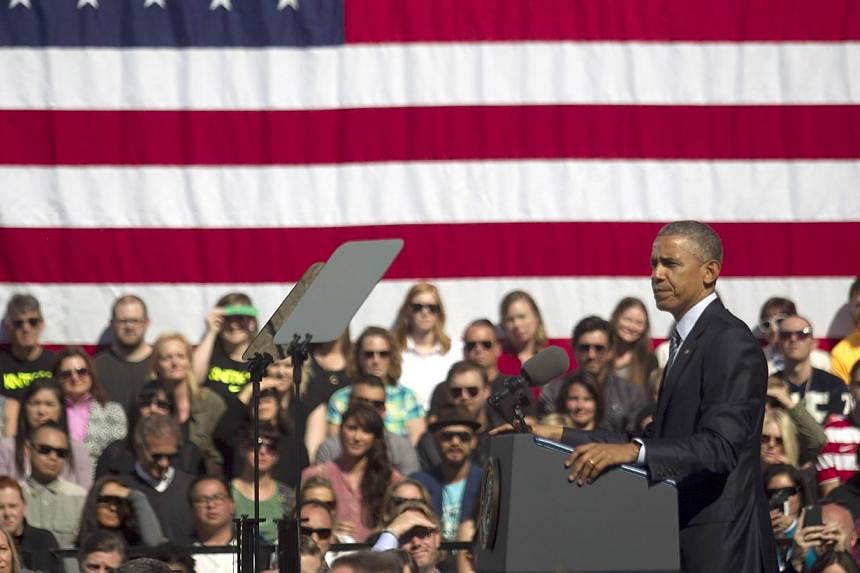Why is Mr Barack Obama so desperate to secure a Trans-Pacific Partnership trade deal? The long-winded official answer is that the US President thinks that it would break down barriers between 12 leading Pacific economies and so increase prosperity. The short, real, answer is: China.
The crucial fact about the TPP is that it is a trade deal that would include the US, Japan and 10 other Pacific-rim economies - but would exclude China. Much of the Washington controversy surrounding the TPP is the standard stuff thrown up by trade negotiations: arguments about farmers, currency and intellectual property. But the underlying motivations of Mr Obama and Mr Shinzo Abe, the Japanese Prime Minister, are strategic.
Unfortunately for Washington and Tokyo, however, the TPP - even if it happens - is not a significant enough step to justify all the geopolitical hopes invested in it.
Debating the strategic logic behind the TPP has been difficult because, until recently, the US has not been frank about the reasons for China's exclusion. The official line is that the Chinese economy is just not open enough to merit inclusion. A couple of weeks ago, however, Mr Obama came closer to acknowledging that the TPP is about much more than trade when he told The Wall Street Journal it was crucial to get the deal because: "If we don't write the rules, China will write the rules... We will be shut out... We don't want China to use its size to muscle other countries in the region."
Mr Obama still framed the argument in economic terms. But others in the US foreign policy establishment are willing to spell out the broader issues of power politics. A much-discussed recent report for the Council on Foreign Relations argued that decades of effort by America to "integrate China into the liberal international order" had in effect backfired because China's power now threatened US "primacy in Asia". Mr Robert Blackwill and Mr Ashley Tellis, the report's authors and two of America's most prominent Asia-watchers, argue for various measures to push back, including "new preferential trading arrangements among US friends and allies... through instruments that consciously exclude China". That is a description of the TPP.
This strategic motivation is even more powerful for Japan, which is embroiled in bitter territorial and diplomatic disputes with China. Initially, Tokyo steered clear of the TPP negotiations to avoid upsetting powerful domestic constituencies. But Mr Abe's fear of the rise of China has trumped his fear of Japanese farmers. He has come to see the TPP as crucial to strengthening the US-Japan alliance and its role in Asia. In a recent speech to the US Congress, the Japanese leader argued that the agreement was ultimately about "democracy and freedom", adding: "Its strategic value is awesome."
The notes of anxiety in these pleas by the US and Japanese leaders reflect the fact that both Washington and Tokyo fear China is on the march in Asia. While the direct territorial dispute between Japan and China has cooled down a little, Chinese claims in the South China Sea are being pushed with renewed energy through controversial "land reclamation" projects, with clear military implications.
On the economic front, America's recent failure to prevent important allies from joining a China-sponsored Asian Infrastructure Investment Bank turned into a humiliation for the US. It now fears the AIIB could become the instrument for promoting China's policy of "one belt, one road" - the effort to build new infrastructure networks across the Asia-Pacific region, which centres on China.
Faced with these setbacks, the Obama administration is now determined to secure the TPP as a visible sign of US influence in the Asia-Pacific region. The President has made a "rebalance" to Asia one of his signature initiatives in foreign policy. His senior officials now accept the TPP has become critical to signalling that the rebalance is alive and well.
However, the TPP cannot really meet the strategic hopes that are now pinned on it. First, it is still far from clear that the 12 countries involved will be able both to strike a deal and secure approval at home. Mr Obama's struggles with Congress give due warning.
More important, it is too late to prevent China from becoming the core of the Asian economy - with all the political and strategic gains that implies. China is already the biggest trading partner of most of the important nations in the TPP negotiations - including Japan, Singapore and Australia - and it is the second-biggest partner of the US itself. China is also the biggest trade partner of South Korea and India - two leading Asian economies that are not even parties to the TPP negotiations. Indeed last week, as Mr Obama was struggling to keep the TPP alive in Congress, Indian Premier Narendra Modi was in China, signing US$22 billion (S$29 billion) of business deals.
Mr Modi's eagerness to do business with China does not mean India is completely at ease with the country's rise. Like most of America's friends and allies in the region, India is encouraging the US to step up its military presence in Asia. But while the US is still the dominant military power in the Asia-Pacific region, China is now the pre-eminent economic power.
A TPP deal would do too little, and be too late, to change that.
THE FINANCIAL TIMES

